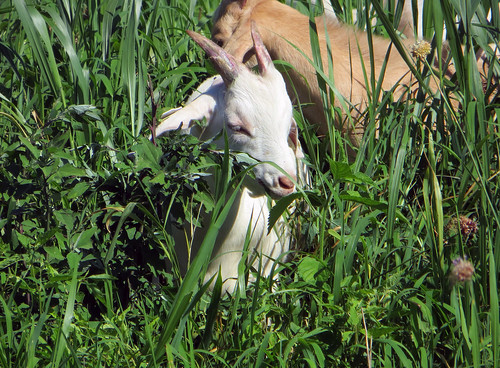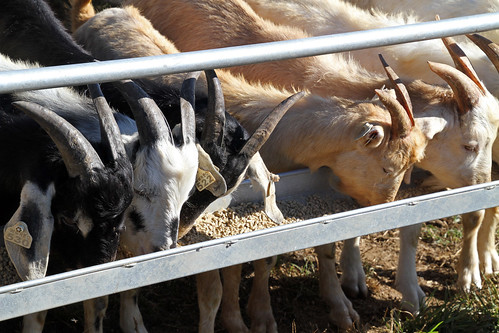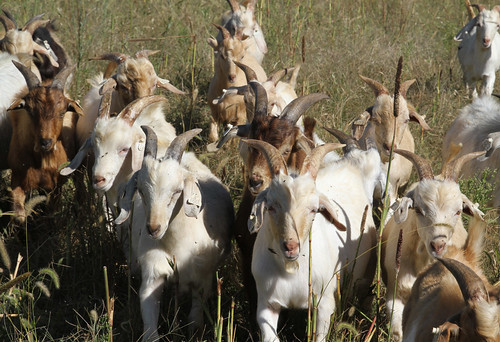The nomination period for the 2016 Western Maryland Pasture-Based Meat Goat Performance Test and Performance & Carcass Contest is now open. All nominations received by the deadline will be treated equally. The nomination deadline is June 1. If nominations exceed test capacity (~80 goats), preference will be given to Maryland residents and previous consignors.
The test and contest are open to goat producers from any state, who may consign up to five male goats to the test and one male goat to the contest. The goats may be of any breed or breed cross, with or without registration papers or eligibility. They must have been born between January 1 and March 15, 2016, and weigh between 40 and 70 lbs. upon delivery to the test site on (Friday) June 24. Goats can be delivered before June 24, if prior arrangements are made.
Prior to delivery, the goats must have received two vaccinations for clostridial diseases (CDT or Covexin®-8) and have been weaned for at least 2 weeks. Hooves should be trimmed if necessary to allow the foot bath solution to penetrate the hoof. There is no benefit to deworming the goats prior to the test (unless a goat is clinically parasitized). Deworming can be detrimental, as it interferes with the development of immunity. Upon arrival, the goats will be sequentially dosed with dewormers from each dewormer class (albendazole + moxidectn + levamisole). It is suggested that they be acclimated to a pasture diet.
To nominate goats for the test and contest, fill out, sign, and send in the nomination form, along with the nomination fee. It is not necessary to choose specific goats until delivery time. Only the number of goats is needed. There is a $20/goat nomination fee for test goats. There is no fee to enter a goat in the performance and carcass contest. The total fee for testing a goat is $120. The balance of payment is due June 24. Consignors who consign five goats to the test, plus a goat to the carcass contest, will receive a $20/head discount. Checks should be made payable to the University of Maryland.
Health papers are required for entry to the test. All goats must be officially identified with USDA scrapie ID. If a goat shows evidence of a contagious disease (e.g. abscess) or is otherwise unhealthy, it will be refused entry to the test. Upon arrival, all goats will be ear-tagged with a program (WMREC) tag. If the goat has a second tag (other than scrapie ID), it will be removed for the new tag.
Upon arrival, all goats will be vaccinated for soremouth (orf, contagious ecthyma). The vaccine will be applied to the inside of the ear. The goats will also stand in a footbath of zinc sulfate. Fecal samples will be collected to quantify the initial worm infection and determine the effectiveness of sequential deworming. The purpose of the sequential deworming is to make sure all goats start the test (on July 7) equally and "free" from worms. This way differences observed during the test can be attributed to genetics and not environment. In order to identify resistant (and resilient) goats, a significant parasite challenge is required.
The test will officially start on July 7, after a 13-day adjustment period. Goats will be weighed two days in a row at the beginning (July 7-8) and end (Sept 29-30) of the test. Weights will be averaged to determine beginning (on-test) and ending (off-test) weights. To improve the accuracy of weights, all goats will be weighed before being scored or having fecal samples collected.
The goats will be handled bi-weekly (on Thursdays) to determine body weights, FAMACHA©, body condition, coat condition, dag, and fecal consistency scores. Fecal samples will be collected bi-weekly from the rectum of each goat. Pooled fecal samples will be collected (from random goats) every 4 weeks. Fecal egg counts and larvae ID will be done by Dr. Dahlia O'Brien's lab at Virginia State University. A pooled fecal sample will also be submitted to the University of Georgia (mid-test) to determine efficacy of anthelmintics.
While on test, the goats will be managed as a single herd on pasture. They will be rotationally-grazed among six ~2-acre paddocks composed of various cool and warm season grasses and legumes. During the first half (42 days) of the test, the goats will graze warm season annuals. They will graze cool season grasses during the second half of the test (42 days). Throughout the test, the goats will be supplemented with grain (whole barley) daily, at a rate not to exceed 1 lb. per head per day. The grain will be introduced during the adjustment period and gradually increased, according to appetite.
The goats will always have access to the central laneway, containing water, feeders, port-a-hut shelters, a handling system (covered by a hoop house), and environmental enrichment. Sick goats will be housed in a treatment pen in the central laneway.
The contest goats will be housed in a zero grazing pen, with ample room for social interaction and expression of natural behavior. They will be fed a ration of hay (alfalfa-orchardgrass mix) and whole barley. Both test goats and contest goats will have free choice access to a mineral mix. The contest goats will be weighed every 4 weeks. At the end of the feeding period, they will be harvested to collect carcass data.
At the conclusion of the test and contest, the 10 top-performing bucks will be identified and recognized. The top performing contest goat (lean gain per day) will be recognized, along with the goat with the best carcass, as determined by percent yield of boneless, fat-free meat.
Please direct any questions pertaining to the test and contest to Susan Schoenian at (301) 432-2767 or sschoen@umd.edu.
The test and contest are open to goat producers from any state, who may consign up to five male goats to the test and one male goat to the contest. The goats may be of any breed or breed cross, with or without registration papers or eligibility. They must have been born between January 1 and March 15, 2016, and weigh between 40 and 70 lbs. upon delivery to the test site on (Friday) June 24. Goats can be delivered before June 24, if prior arrangements are made.
 |
| The goats will start the test on warm season annuals. |
Prior to delivery, the goats must have received two vaccinations for clostridial diseases (CDT or Covexin®-8) and have been weaned for at least 2 weeks. Hooves should be trimmed if necessary to allow the foot bath solution to penetrate the hoof. There is no benefit to deworming the goats prior to the test (unless a goat is clinically parasitized). Deworming can be detrimental, as it interferes with the development of immunity. Upon arrival, the goats will be sequentially dosed with dewormers from each dewormer class (albendazole + moxidectn + levamisole). It is suggested that they be acclimated to a pasture diet.
To nominate goats for the test and contest, fill out, sign, and send in the nomination form, along with the nomination fee. It is not necessary to choose specific goats until delivery time. Only the number of goats is needed. There is a $20/goat nomination fee for test goats. There is no fee to enter a goat in the performance and carcass contest. The total fee for testing a goat is $120. The balance of payment is due June 24. Consignors who consign five goats to the test, plus a goat to the carcass contest, will receive a $20/head discount. Checks should be made payable to the University of Maryland.
Health papers are required for entry to the test. All goats must be officially identified with USDA scrapie ID. If a goat shows evidence of a contagious disease (e.g. abscess) or is otherwise unhealthy, it will be refused entry to the test. Upon arrival, all goats will be ear-tagged with a program (WMREC) tag. If the goat has a second tag (other than scrapie ID), it will be removed for the new tag.
Upon arrival, all goats will be vaccinated for soremouth (orf, contagious ecthyma). The vaccine will be applied to the inside of the ear. The goats will also stand in a footbath of zinc sulfate. Fecal samples will be collected to quantify the initial worm infection and determine the effectiveness of sequential deworming. The purpose of the sequential deworming is to make sure all goats start the test (on July 7) equally and "free" from worms. This way differences observed during the test can be attributed to genetics and not environment. In order to identify resistant (and resilient) goats, a significant parasite challenge is required.
 |
| This year, the goats will be supplemented with whole barley. |
The test will officially start on July 7, after a 13-day adjustment period. Goats will be weighed two days in a row at the beginning (July 7-8) and end (Sept 29-30) of the test. Weights will be averaged to determine beginning (on-test) and ending (off-test) weights. To improve the accuracy of weights, all goats will be weighed before being scored or having fecal samples collected.
The goats will be handled bi-weekly (on Thursdays) to determine body weights, FAMACHA©, body condition, coat condition, dag, and fecal consistency scores. Fecal samples will be collected bi-weekly from the rectum of each goat. Pooled fecal samples will be collected (from random goats) every 4 weeks. Fecal egg counts and larvae ID will be done by Dr. Dahlia O'Brien's lab at Virginia State University. A pooled fecal sample will also be submitted to the University of Georgia (mid-test) to determine efficacy of anthelmintics.
While on test, the goats will be managed as a single herd on pasture. They will be rotationally-grazed among six ~2-acre paddocks composed of various cool and warm season grasses and legumes. During the first half (42 days) of the test, the goats will graze warm season annuals. They will graze cool season grasses during the second half of the test (42 days). Throughout the test, the goats will be supplemented with grain (whole barley) daily, at a rate not to exceed 1 lb. per head per day. The grain will be introduced during the adjustment period and gradually increased, according to appetite.
The goats will always have access to the central laneway, containing water, feeders, port-a-hut shelters, a handling system (covered by a hoop house), and environmental enrichment. Sick goats will be housed in a treatment pen in the central laneway.
 |
| Last year's goats were all Kiko or Kiko-influenced. |
The contest goats will be housed in a zero grazing pen, with ample room for social interaction and expression of natural behavior. They will be fed a ration of hay (alfalfa-orchardgrass mix) and whole barley. Both test goats and contest goats will have free choice access to a mineral mix. The contest goats will be weighed every 4 weeks. At the end of the feeding period, they will be harvested to collect carcass data.
At the conclusion of the test and contest, the 10 top-performing bucks will be identified and recognized. The top performing contest goat (lean gain per day) will be recognized, along with the goat with the best carcass, as determined by percent yield of boneless, fat-free meat.
Please direct any questions pertaining to the test and contest to Susan Schoenian at (301) 432-2767 or sschoen@umd.edu.











